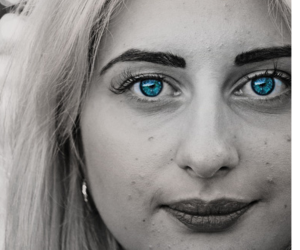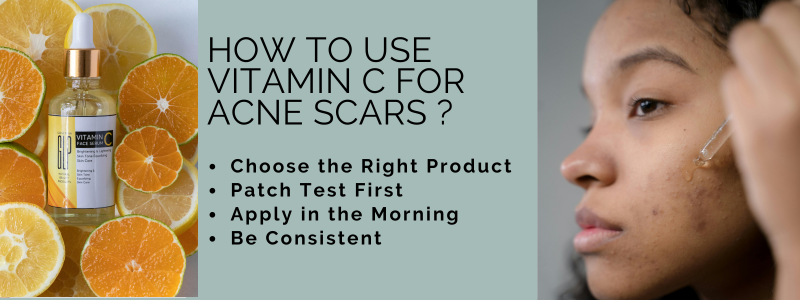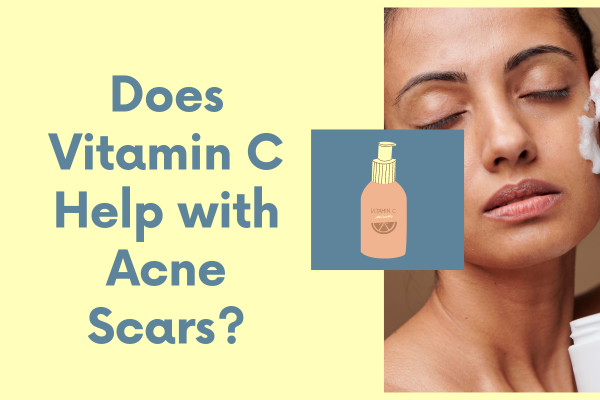Acne scars are a common concern for many people, especially after dealing with acne breakouts. Among various treatments, Vitamin C has gained popularity as a skincare ingredient for addressing scars and pigmentation issues. But the question remains, does Vitamin C help with acne scars? Let’s dive into the benefits of Vitamin C for the skin and how it may help improve the appearance of acne scars.
What is Vitamin C?
Vitamin C, also known as ascorbic acid, is a powerful antioxidant that plays a critical role in maintaining skin health. It helps neutralize free radicals, which can damage skin cells and contribute to premature aging. Vitamin C is also essential for the synthesis of collagen, the protein that gives skin its structure and firmness. Due to its numerous benefits, it is often included in serums, creams, and other topical skincare products.
Types of Acne Scars

Before understanding how Vitamin C works on acne scars, it’s essential to identify the types of acne scars:
1. Atrophic Scars:
These are depressions or indentations in the skin caused by a loss of tissue. Examples include icepick scars, boxcar scars, and rolling scars.
2. Hypertrophic Scars:
These are raised scars that form when too much collagen is produced during healing
3. Post-Inflammatory Hyperpigmentation (PIH):
While not technically a scar, PIH refers to dark spots or patches left behind after acne heals.
Vitamin C is particularly beneficial for treating PIH and improving overall skin texture, making it an effective option for some types of acne scars.
How Does Vitamin C Help with Acne Scars?
1. Boosts Collagen Production
One of Vitamin C’s main benefits is its ability to boost collagen synthesis. Collagen is vital for repairing and rebuilding damaged skin. For those with atrophic scars (depressed scars), increased collagen production can help fill in the indented areas, making the scars less noticeable over time.
2. Reduces Hyperpigmentation
Post-inflammatory hyperpigmentation (PIH) often occurs after acne breakouts, leading to dark spots that can linger for months. Vitamin C inhibits the enzyme tyrosinase, which is responsible for producing melanin, the pigment that gives skin its color. By reducing melanin production, Vitamin C can lighten dark spots and even out skin tone, helping to fade acne-related pigmentation issues.
3. Fights Inflammation
Acne scars often come with inflammation, especially during the healing process. Vitamin C’s anti-inflammatory properties can help reduce redness, swelling, and irritation, promoting faster healing and reducing the appearance of scars.
4. Neutralizes Free Radicals
Vitamin C is a potent antioxidant, which means it protects the skin from damage caused by environmental aggressors such as UV rays, pollution, and stress. Free radicals can interfere with the skin’s healing process, so neutralizing them can speed up recovery and prevent further skin damage.
How to Use Vitamin C for Acne Scars?

If you’re wondering, does Vitamin C help with acne scars and whether it’s worth incorporating into your skincare routine, the answer is often yes, especially for mild scarring and pigmentation. Here’s how to get the most out of Vitamin C for acne scars:
1. Choose the Right Product
Look for serums or creams that contain a stable form of Vitamin C, such as L-ascorbic acid. A concentration between 10% and 20% is generally effective for most skin types.
2. Patch Test First
Vitamin C can be potent, so it’s always a good idea to do a patch test on a small area of your skin before applying it to your entire face.
3. Apply in the Morning
Vitamin C is best used in the morning because it helps protect the skin from environmental damage throughout the day. Apply after cleansing but before moisturizing and sunscreen.
4. Be Consistent
Vitamin C takes time to show results, especially when it comes to acne scars. Regular use over several weeks or months is necessary for noticeable improvements.
Does Vitamin C Work for All Acne Scars?
- While Vitamin C can be highly effective for treating post-inflammatory hyperpigmentation and minor scarring, it may not work as well on deep, pitted scars such as ice-pick or boxcar scars.
- For these types of scars, other treatments such as chemical peels, micro needling, or laser therapy might be more effective in conjunction with Vitamin C.
Potential Side Effects–
For most people, Vitamin C is well-tolerated. However, those with sensitive skin may experience mild irritation, redness, or dryness. If you notice any adverse reactions, consider using a lower concentration or consult with a dermatologist.
Conclusion
- So, does Vitamin C help with acne scars? The answer is yes—but primarily for those dealing with post-inflammatory hyperpigmentation and minor scars.
- Its ability to boost collagen production, reduce pigmentation, and protect against environmental damage makes it a valuable ingredient in treating acne scars.
- While it may not be a miracle cure for deep, pitted scars, consistent use of Vitamin C can significantly improve skin tone, texture, and overall radiance.
For best results, combine Vitamin C with other scar treatments under the guidance of a skincare professional to achieve smoother, more even skin.


1 thought on “Does Vitamin C Help with Acne Scars?”
Comments are closed.